
French postcard by Erpé, no. 611. Photo: Vitagraph. Fredric March in Anthony Adverse (Mervyn LeRoy, Michael Curtiz, 1936).

American film still by Paramount, no. 1394-120. Fredric March and Elissa Landi in The Sign of the Cross (Cecil B. DeMille, 1932).

British postcard by Abdulla Cigarettes, no. 27. Photo: M.G.M. Fredric March and Norma Shearer in The Barretts of Wimpole Street (Sidney Franklin, 1934).

British postcard by De Reszke Cigarettes, no. 17.
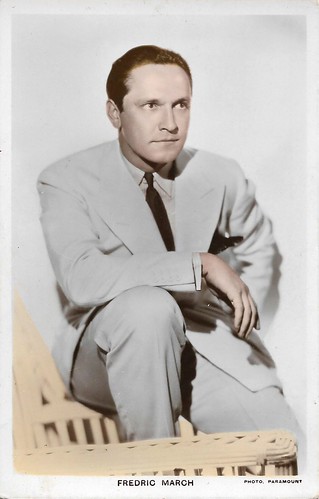
British postcard in the Colourgraph Series, no. C175. Photo: Paramount.

British postcard in the Real Photogravure Portrait series. Photo: Fredric March in Anthony Adverse (Mervyn LeRoy, 1936).
A rare protean quality to his acting
Fredric March was born Ernest Frederick McIntyre Bickel in 1897 in Racine, Wisconsin, USA. He was the son of Cora Brown Marcher, a schoolteacher from England, and John F. Bickel, a devout Presbyterian Church elder who worked in the wholesale hardware business. March attended the Winslow Elementary School, Racine High School, and the University of Wisconsin–Madison.
He served in the United States Army during World War I as an artillery lieutenant. After the war, he began a career in banking but in 1920 found himself cast as an extra in films being produced in New York. In 1924, he shortened Frederick to Fredric, shortened his mother's maiden name from Marcher to March, and his stage name was born.
Fredric March starred on the Broadway stage first in 1926 and would return there between screen appearances later on. He won plaudits and an Academy Award nomination for his send-up of John Barrymore in The Royal Family of Broadway (George Cukor, Cyril Gardner, 1930) opposite Ina Claire.
March would win the Oscar for Best Actor for Dr. Jekyll and Mr. Hyde (Rouben Mamoulian, 1931) and three more Academy Award nominations would come his way. Wikipedia: "Like Laurence Olivier, March had a rare protean quality to his acting that allowed him to assume almost any persona convincingly, from Robert Browning to William Jennings Bryan to Dr. Jekyll - or Mr. Hyde."
He starred in a series of classic films based on stage hits and classic novels like Design for Living (Ernst Lubitsch, 1933) with Gary Cooper and Miriam Hopkins, Death Takes a Holiday (Mitchell Leisen, 1934), Les Misérables (Richard Boleslawski, 1935) with Charles Laughton, and Anna Karenina (Clarence Brown, 1935) with Greta Garbo.
He also played the title figure in Anthony Adverse (Mervyn LeRoy, 1936) with Olivia de Havilland, and was the original Norman Maine in A Star is Born (William A. Wellman, 1937) with Janet Gaynor, for which he received his third Academy Award nomination.
In 1936, March co-founded the Hollywood Anti-Nazi League (HANL), along with writers Dorothy Parker and Donald Ogden Stewart, director Fritz Lang, and composer Oscar Hammerstein. In 1938, March was one of many Hollywood personalities investigated by the House of Committee on Un-American Activities (HUAC) and the hunt for Communists in the film community. In July 1940, he was again questioned by a HUAC subcommittee led by Representative Martin Dies.
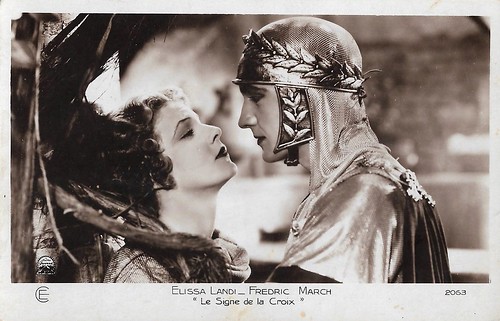
French postcard by Editions Cinémagazine, no. 2063. Photo: Paramount. Fredric March and Elissa Landi in the American epic film The Sign of the Cross (Cecil B. DeMille, 1932).

British postcard in the Filmshots series by Film Weekly. Photo: Paramount. Fredric March and Claudette Colbert in Tonight is Ours (Stuart Walker, 1933).
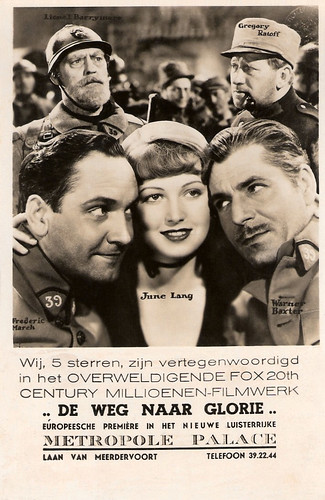
Dutch postcard for Metropole Palace, Den Haag (The Hague). Photos: 20th Century Fox. Fredric March, June Lang, Warner Baxter, Lionel Barrymore, and Gregory Ratoff in The Road to Glory (Howard Hawks, 1936). Caption: We, 5 stars, are represented in the overwhelming Fox 20th Century millions-film work The Way to Glory. European premiere in the new glorious Metropole Palace, Laan van Meerdervoort, telephone 39.22.44.
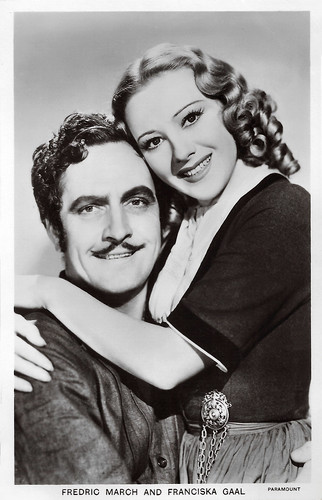
British postcard in the Film Partners Series, London, no. P 243. Photo: Paramount. Fredric March and Franciska Gaal in The Buccaneer (Cecil B. DeMille, 1938).

British postcard in the Film Partners Series, London, no. P 264. Photo: Walter Wanger. Fredric March and Joan Bennett in Trade Winds (Tay Garnett, 1938).

German postcard by Ross Verlag, no. 9313/1, 1935-1936. Photo: Metro-Goldwyn-Mayer. Greta Garbo and Fredric March in Anna Karenina (Clarence Brown 1935).
Men in anguish
In 1947, Fredric March won the highest awards for giving the best performances of the year in two distinct mediums: an Oscar for The Best Years of Our Lives (William Wyler, 1946) and a Tony for 'Years Ago'. Two years later, he was targeted for blacklisting by the House Un-American Activities Committee because of his supposed "leftist" politics.
March continued to play varying roles from heavy drama to light comedy and often portrayed men in anguish, such as Willy Loman in Death of a Salesman (Laslo Benedek, 1951). As his career advanced he progressed from leading man to character actor.
After 1958, he worked mostly on stage. On stage, he won two Tony Awards as Best Actor (Dramatic), the first in 1947 for his performance in Ruth Gordon's 'Years Ago', an award shared with José Ferrer for 'Cyrano de Bergerac', and the second, ten years later, in 1957, for his landmark performance in Eugene O'Neill's 'Long Day's Journey Into Night'. He was also nominated in the same category in 1962 for Paddy Chayefsky's 'Gideon'.
On-screen, March co-starred with Spencer Tracy in the film Inherit the Wind (Stanley Kramer, 1960), in which he played a dramatised version of famous orator and political figure William Jennings Bryan. In the 1960s, March played President Jordan Lyman in the political thriller Seven Days in May (John Frankenheimer, 1964), in which he co-starred with Burt Lancaster, Kirk Douglas, and Edmond O'Brien. The part earned March a Golden Globe nomination as Best Actor.
For a while after undergoing major surgery for prostate cancer in 1970, it seemed March's acting career was finished. However, he was able to give one final great performance in The Iceman Cometh (John Frankenheimer, 1973) with Lee Marvin and Robert Ryan.
In 1975, Fredric March died of prostate cancer in Los Angeles. He was married twice. From 1925 till 1927, he was married to Ellis Baker. In 1927 he married actress Florence Eldridge with whom he adopted two children, Penelope ("Penny", 1932) and Anthony (1934). The couple remained together till his death.

French postcard by Editions Cinémagazine, no. 2062. Photo: Paramount. Fredric March in the American epic film The Sign of the Cross (Cecil B. DeMille, 1932).
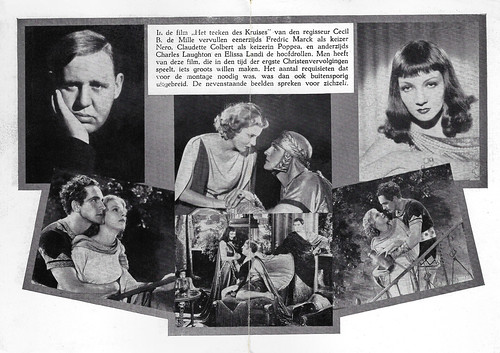
Dutch flyer, part 2. Charles Laughton, Fredric March, Elissa Landi, and Claudette Colbert in The Sign of the Cross (Cecil B. DeMille, 1932).

Dutch flyer, part 3. Fredric March in The Sign of the Cross (Cecil B. DeMille, 1932).

German collectors card by Ross Verlag in the Bunte Filmbilder series, Bild no. 212, for Lloyd Zigaretten. Photo: Paramount. Fredric March in The Eagle and the Hawk (Stuart Walker, 1933).

French postcard by EC, no. 561. Photo: Paramount Pictures. Fredric March in Death Takes a Holiday (Mitchell Leisen, 1934).

French postcard by A.N., Paris, no. 892. Photo: Paramount.

British Real Photograph postcard, no. 50. Photo: Paramount Pictures.

British postcard in the Picturegoer Series, London, no. 488b. Photo: Paramount.
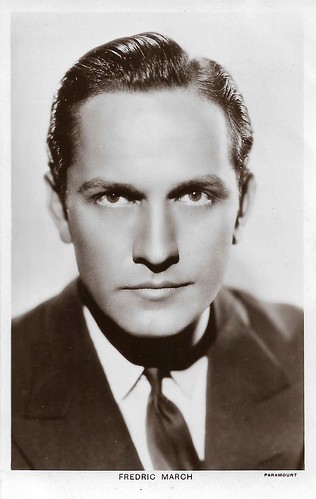
British postcard in the Picturegoer Series, London, no. 488c. Photo: Paramount.

German postcard by Ross Verlag, no. 5593/1, 1930-1931. Photo: Paramount.

German postcard by Ross Verlag, no. 8793/1, 1933-1934. Photo: Metro-Goldwyn-Mayer. Fredric March in The Barretts of Wimpole Street (Sidney Franklin, 1934).

German postcard by Ross Verlag, no. A 2768/1, 1939-1940. Photo: Paramount.

Italian postcard by B.F.F. Edit., no. 3514. Photo: 20th Century.
Sources: Bill Takacs (IMDb), Wikipedia, and IMDb.
No comments:
Post a Comment